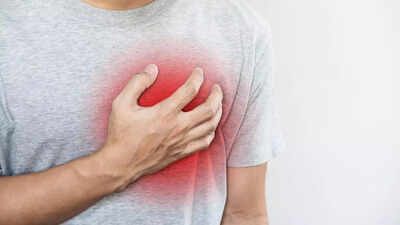How to survive a heart attack alone: Essential steps to take immediately |

Experiencing a heart attack alone can be a terrifying situation, but knowing the right steps can significantly increase your chances of survival. In India, where cardiovascular diseases are a leading cause of death, being prepared is crucial. According to experts, the first and most vital action is to call emergency services immediately. While waiting for help, taking an aspirin if you are not allergic can help thin the blood and reduce heart damage. Controlled breathing and mild coughing may help maintain circulation temporarily, and elevating your legs can ease strain on the heart.Certified cardiologists emphasize the importance of staying calm to prevent additional stress on the cardiovascular system. Being practically prepared, such as knowing emergency numbers, keeping medications handy, and informing family members about your health status, can make a life-saving difference. A recent study published in the Journal of the American Heart Association found that self-administration of aspirin within four hours of severe chest pain onset has the potential to save approximately 13,000 lives per year in the U.S. population.In this guide, we will explore the symptoms of a heart attack, the best actions if you are alone, and preventive measures to reduce your heart attack risk.
Understanding heart attack symptoms when alone
Recognizing the signs of a heart attack is the first step to survival. Common symptoms include:
- Chest pain or tightness
- Pain radiating to the neck, back, jaw, or stomach
- Shortness of breath
- Cold sweat
- Nausea, dizziness, or lightheadedness
Symptoms can vary. Women may experience subtler signs such as fatigue or mild nausea. If you suspect a heart attack, even with mild symptoms, call for medical help immediately. Early recognition is critical in reducing heart damage and improving outcomes.
Immediate steps to take during a heart attack alone
If you are alone and experiencing a heart attack, follow these steps:
- Call emergency services immediately. Dial your local emergency number.
- Take aspirin if available. Chew one tablet if you are not allergic to help thin the blood and limit heart damage.
- Stay calm and seated. Rest in a comfortable position to reduce strain on the heart.
- Elevate your legs slightly. This can help circulation if you feel lightheaded.
- Unlock doors for responders. Allow emergency personnel quick access.
- Do not attempt to drive yourself. Wait for professional help.
Helping someone alone during a heart attack
If you suspect someone else is having a heart attack and is alone, encourage them to call emergency services immediately. If they cannot, call on their behalf. Stay on the line to provide guidance and reassurance. If they are conscious and not allergic to aspirin, offer one to chew. Keep them calm and ensure minimal movement until help arrives.
Preventive measures to reduce heart attack risk
While not all heart attacks can be prevented, certain lifestyle changes significantly lower the risk:
- Eat a balanced diet. Include fruits, vegetables, whole grains, and lean proteins.
- Exercise regularly. Aim for at least 30 minutes of moderate activity most days.
- Quit smoking. Avoid tobacco and secondhand smoke.
- Limit alcohol intake. Consume in moderation if at all.
- Manage stress. Practice meditation, deep breathing, or yoga.
- Regular health check-ups. Monitor blood pressure, cholesterol, and blood sugar.
- These habits are especially important for individuals with a family history of heart disease.
Being alone during a heart attack is critical, but quick action can save lives. Recognizing symptoms early, calling emergency services immediately, and following the recommended steps, such as taking aspirin, staying calm, and resting, can significantly improve survival outcomes. Additionally, adopting a heart-healthy lifestyle and regular medical check-ups can prevent future heart problems.Preparedness is key. Knowing emergency contacts and understanding heart attack first aid are essential for everyone. Stay informed, act fast, and prioritize your heart health.Disclaimer: This article is for general informational purposes only and is not a substitute for professional medical advice, diagnosis, or treatment. Always seek the guidance of a qualified healthcare provider regarding any medical condition or lifestyle change.Also read| Can getting pricked by a safety pin cause tetanus? Understanding the risks and prevention






